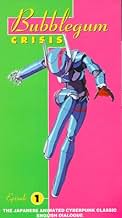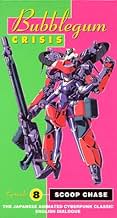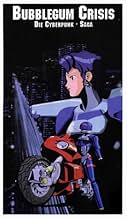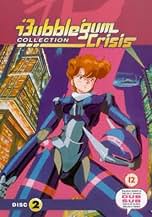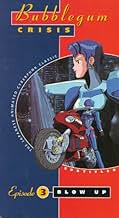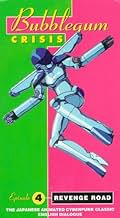CALIFICACIÓN DE IMDb
7.3/10
1.9 k
TU CALIFICACIÓN
Un equipo de mercenarias, armadas con armaduras únicas, luchan contra las fuerzas de la corrupta megacorporación Genom en el Tokio futurista.Un equipo de mercenarias, armadas con armaduras únicas, luchan contra las fuerzas de la corrupta megacorporación Genom en el Tokio futurista.Un equipo de mercenarias, armadas con armaduras únicas, luchan contra las fuerzas de la corrupta megacorporación Genom en el Tokio futurista.
Explorar episodios
Opiniones destacadas
Following the Knight Sabers, a highly elite group of female mercenaries living in a futuristic cyberpunk Tokyo, where they take down machines known as Boomers, many created by the evil mega-corp Genom. This whole series screams 80s anime and I loved it. The original series is only 8 episodes released over multiple years, produced more as OVAs (Original Video Animations) rather than a series, meaning each episode tends to be longer, typically at 44 minutes, and is considerably higher budget than the traditional 26 episode 22 minute standard we often see. This also means each storyline, while generally disjoint from other episodes, is a bit more involved or complex than other anime shows of the time, and I was quite impressed by its visuals. The art and aesthetic is perfect though and through. If you're one to have nostalgia from any of that sci-fi anime future punk era: Akira, Mobile Suit, Robotech, etc, you're going to love this. Definitely adult, there is nudity, violence, and swearing, the plots are generally good, again with each narrative being self contained per episode and each slowly clueing us in on the futuristic city, its technology, and how society now functions. Its not all great, plot-wise we never really get as much explained as we'd like, characters don't really develop, and with transforming vigilante heroes a la Charlie's Angels meets Power Rangers, there's a lot of tropes presented, some great, some not the best. I don't know enough anime history to say which if these tropes the series pioneered vs simply reenforced, but overall I did constantly have fun and felt vested in the characters. Unfortunately the english dub of this series is also not the best, with a lot of line delivery being very questionable if not laughable, but if you're like me it somehow only added to the charm and nostalgia. Also something not an issue if you watch the original subbed, so I can't fault it for that anyway. Fortunately for those wanting more there's multiple other spin-offs and reboots since this original, and for all this series was it deserves them, I'd already consider this a classic.
The DVD set of this series is excellent. The sound is great, and the picture quality is perfect, even surpassing the laserdisc release. The ability to watch it in the original Japanese without subtitles covering the picture is nice, also. All 8 episodes are in the set, which is a steal at about $50 (compared to about $120 for the tapes, or around $100 for the laserdiscs, if you can even find them). My only complaint is that the music videos are compressed really badly, giving them an M-PEG look, and compared to how the actual episodes look in this set, that low quality is unacceptable. Still, that one complaint aside, this set is more than worth the money if you like this series even a little.
I have recently finished watching 'Bubblegum Crisis' for the second time, on DVD, and I found myself both entertained and impressed.
The problem with most sci-fi and robot anime is that they are too heavy-handed and dark; as well, they often suffer from plodding and boring plots, to the point where they are not enjoyable to watch. Not so with 'Bubblegum Crisis'. The series is actually divided into two main storylines which comprise six episodes, and two side stories for the other two episodes. While the main stories require some concentration, they are interesting without being convoluted. _BC_ does not try to ponder the human condition or find the meaning of life, as other SF stories do, but simply creates stories that the viewer can enjoy. As well, there are some plot threads that are developed throughout the series, making events and characters more significant and more part of the story. While some may argue that 'BC' is nothing but science fiction lite, it keeps the viewer absorbed, which is more than I can say for most of the sci-fi anime I have watched.
I'd say that this series's greatest strength is its characters. Not only are they well developed, but they interact wonderfully with one another. Their differing and often conflicting personalities make the viewer identify with them, their lives, and their problems. We see people trying to cope with violence and destruction on a daily basis and simultaneously keep their humanity somehow. I believe that too many anime fall into the trap of trying to impress the viewer with things such as animation, sex, and violence, forgetting more important things such as character development and interaction. Like all the other best anime, however, 'BC' not only avoids this trap, but defines new standards.
'Bubblegum Crisis' also succeeds in its use of rock music, integrating it into the series and drawing the viewer in. Even though the songs are in Japanese, I still enjoyed them and was impressed by the quality of the songwriting. I should point out that these songs are some of the few I remember from any anime.
I thought the animation was excellent, especially for an OVA. The inevitable darkness of Neo Tokyo was nicely balanced by the brighter colors of the interiors of homes, shops, etc. This was another thing that kept the series from descending into sci-fi boredom. As well, the characters are animated according to their personalities, helping to develop them.
So I would call 'Bubblegum Crisis' a success because it manages to entertain all audiences, not just sci-fi and robot fans. In fact, it even entertained me.
The problem with most sci-fi and robot anime is that they are too heavy-handed and dark; as well, they often suffer from plodding and boring plots, to the point where they are not enjoyable to watch. Not so with 'Bubblegum Crisis'. The series is actually divided into two main storylines which comprise six episodes, and two side stories for the other two episodes. While the main stories require some concentration, they are interesting without being convoluted. _BC_ does not try to ponder the human condition or find the meaning of life, as other SF stories do, but simply creates stories that the viewer can enjoy. As well, there are some plot threads that are developed throughout the series, making events and characters more significant and more part of the story. While some may argue that 'BC' is nothing but science fiction lite, it keeps the viewer absorbed, which is more than I can say for most of the sci-fi anime I have watched.
I'd say that this series's greatest strength is its characters. Not only are they well developed, but they interact wonderfully with one another. Their differing and often conflicting personalities make the viewer identify with them, their lives, and their problems. We see people trying to cope with violence and destruction on a daily basis and simultaneously keep their humanity somehow. I believe that too many anime fall into the trap of trying to impress the viewer with things such as animation, sex, and violence, forgetting more important things such as character development and interaction. Like all the other best anime, however, 'BC' not only avoids this trap, but defines new standards.
'Bubblegum Crisis' also succeeds in its use of rock music, integrating it into the series and drawing the viewer in. Even though the songs are in Japanese, I still enjoyed them and was impressed by the quality of the songwriting. I should point out that these songs are some of the few I remember from any anime.
I thought the animation was excellent, especially for an OVA. The inevitable darkness of Neo Tokyo was nicely balanced by the brighter colors of the interiors of homes, shops, etc. This was another thing that kept the series from descending into sci-fi boredom. As well, the characters are animated according to their personalities, helping to develop them.
So I would call 'Bubblegum Crisis' a success because it manages to entertain all audiences, not just sci-fi and robot fans. In fact, it even entertained me.
TERMINATOR/BOOMER MEETS JEM/PRISS MERGED WITH TRANSFORMERS/EXO-ARMOR PRODUCED BY AIC, MY CHILDHOOD IS COMPLETE! Come on, You know What I have to Rate Bubblegum Crisis. It's getting My TM M for Moonbeam 87 Approved.
In a "Blade Runner" like future, four vigilante women - the Knight Sabers - assist the AD Police in fighting boomers, living machines not unlike the Replicants from "Blade Runner". The Knight Saber ring leader is Sylia Stingray, a rich, mysterious brunette who is the daughter of the man who created the boomers and whom might actually be a boomer herself. The others include rebellious biker girl Priss Asagiri, aerobics instructor Linna Yamazki and ADP computer hacker Nene. Other characters include ADP man Leon McNichol, a Brad Pitt like pretty boy with high ideals and a jerky attitude as well as a thing for Priss and with Leon is his hilarious partner Daley Wong. Oh and Sylia has a pervert whiz kid for a brother by name of Mackey. The villains include Quincy, chairman of GENOM, the company that produces the boomers, his right hand man Brian J. Mason (killed off too soon) and an obnoxious boomer man named Largo.
A good series overall, but being dated is the least of its problems. Originally slated for 13 episodes, it was cut short at episode 8, leaving many series plot threads unresolved. A sequel series, Bubblegum Crash, was concocted to solve this problem but it didn't help. Also the characters are never as well developed as you would like them to be. The most interesting character, the Knight Saber ringleader Sylia, is never completely explored. Linna had potential, but her subplot involving a friend who was apart of a mafia family was never resolved and most of the time Linna was just ignored. Nene was cute and funny but only had one episode to call her own, the last one. Sadly, most of the series attention was centered on Priss, who somehow became the most popular character of the series, so much in fact that although she was originally suppose to die, a fan backlash saved her; I think this was due partly to the fact that she was voiced by a then popular Japanese singer. But Priss herself was not that interesting of a character: all her episodes basically revolve around her seeking revenge for a minor character friend that we the audience sometimes didn't even get to know in depth. Priss became repetitive and dull after a certain point. I could never quite figure out what Leon saw in her.
But the series itself is not inherently bad. Animation is still pretty good in most of the eps (excluding the first one, which is a bit herky jerky, and the last one, in which the characters are drawn much too thinly) and it had an interesting theme on humanity VS technology.
Remade for TV as "Bubblegum Crisis Tokyo 2040" in 1999. Hate to say it, but 2040 was superior in many ways, though not completely perfect in and of itself.
A good series overall, but being dated is the least of its problems. Originally slated for 13 episodes, it was cut short at episode 8, leaving many series plot threads unresolved. A sequel series, Bubblegum Crash, was concocted to solve this problem but it didn't help. Also the characters are never as well developed as you would like them to be. The most interesting character, the Knight Saber ringleader Sylia, is never completely explored. Linna had potential, but her subplot involving a friend who was apart of a mafia family was never resolved and most of the time Linna was just ignored. Nene was cute and funny but only had one episode to call her own, the last one. Sadly, most of the series attention was centered on Priss, who somehow became the most popular character of the series, so much in fact that although she was originally suppose to die, a fan backlash saved her; I think this was due partly to the fact that she was voiced by a then popular Japanese singer. But Priss herself was not that interesting of a character: all her episodes basically revolve around her seeking revenge for a minor character friend that we the audience sometimes didn't even get to know in depth. Priss became repetitive and dull after a certain point. I could never quite figure out what Leon saw in her.
But the series itself is not inherently bad. Animation is still pretty good in most of the eps (excluding the first one, which is a bit herky jerky, and the last one, in which the characters are drawn much too thinly) and it had an interesting theme on humanity VS technology.
Remade for TV as "Bubblegum Crisis Tokyo 2040" in 1999. Hate to say it, but 2040 was superior in many ways, though not completely perfect in and of itself.
¿Sabías que…?
- TriviaThere are many references to Blade Runner:
- The band is called "The Replicants";
- The general mission in both is to kill androids who are almost too human;
- There happen to be characters named Leon and Priss in both;
- Both feature a huge, pyramid-shaped building.
- Citas
Priscilla S. Asagiri "Priss": You little idiot! If you die, what will Sylvie have died for?
- ConexionesEdited into Baburugamu kuraishisu hariken raibu! 2032 (1988)
- Bandas sonorasKonya Wa Hurricane
(There's a Hurricane Tonight)
Lyrics by Tomoko Aran (as Aran Tomoko)
Music by Kisaburô Suzuki (as Suzuki Kisaburoo)
Arranged by Nakashima Masao
Performed by Kinuko Ômori (as Oomori Kinuko)
English Performance by Joyce Leigh Bowden
Selecciones populares
Inicia sesión para calificar y agrega a la lista de videos para obtener recomendaciones personalizadas
- How many seasons does Bubblegum Crisis have?Con tecnología de Alexa
Detalles
Contribuir a esta página
Sugiere una edición o agrega el contenido que falta

